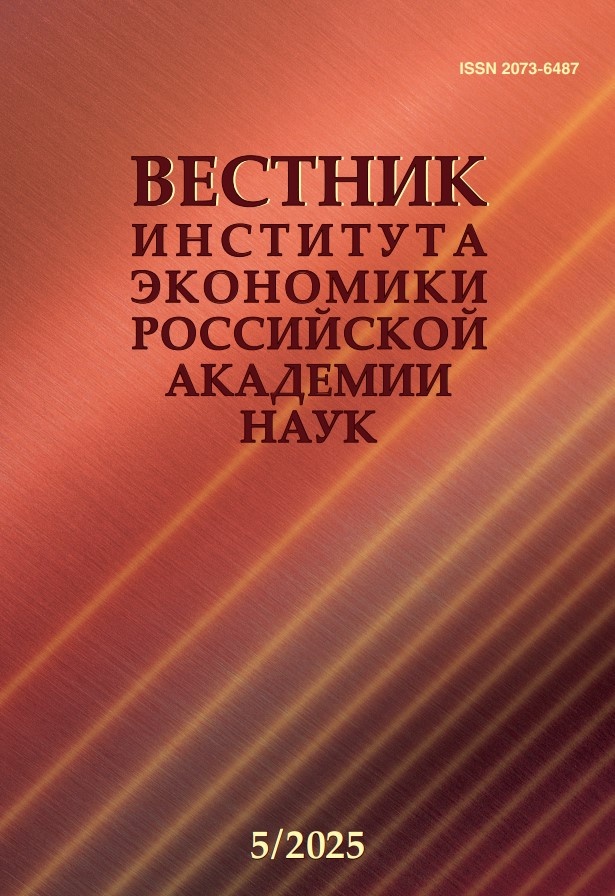Unity of the national economic space and preferential economic zones
- Authors: Vilenskiy A.V.1
-
Affiliations:
- Institute of Economics of the RAS
- Issue: No 5 (2025)
- Pages: 46-64
- Section: Economics and management
- URL: https://journal-vniispk.ru/2073-6487/article/view/352250
- DOI: https://doi.org/10.52180/2073-6487_2025_5_46_64
- EDN: https://elibrary.ru/ROCCAY
- ID: 352250
Cite item
Full Text
Abstract
The conducted research has shown that preferential economic zones with their special economic conditions in different territories of the country are not the opposite, but an integral part of the unity of the national economic space. Unity does not mean universal uniformity, sameness. The state purposefully creates preferential territorial zones with their own specific rules of management regulations, special organization of state and municipal management governance of the territory, special management governance techniques that nominally violate the unity of economic conditions in the country. However, preferential economic zones themselves, preferential regional and municipal taxation are being created and introduced to generally improve business conditions, to increase national competitiveness, to reduce inter-regional socio-economic differentiation and, consequently, to strengthen the unity of the national economic space. Preferential zones are designed to strengthen this unity.
About the authors
Aleхander V. Vilenskiy
Institute of Economics of the RAS
Author for correspondence.
Email: avilenski@mail.ru
ORCID iD: 0000-0002-3019-7460
Dr. Sci. (Econ.), Professor, Chief Researcher, Head of the Sector
Russian Federation, MoscowReferences
- Polyakova A.G., Simarova I.S. Regional economic space and territorial development: assessment of the action of security forces // Bulletin of UrFU. Economics and Management series. 2014. No. 2. Pp. 48–60. (In Russ.).
- Gottner A. Geography. Its history, essence and methods, State Publishing House, Moscow-Leningrad. 1930. (In Russ.).
- Ritter K. Land Geoscience of Asia: geography of countries in direct relations with Russia, that is, the Chinese Empire, Independent Tartary, Persia and Siberia / [op.] by Karl Ritter; Translated on behalf of the Russian Geographical Society with additions, serving as a continuation of Ritter’s work for materials published since 1832 and complied by P. Semenov, Full Member of the Russian Geographical Society. St. Petersburg: Printing House of the Imperial Academy of Sciences, 1856–1874. (In Russ.).
- Kotov A. The economic landscape of the Northern Railway line from Moscow station to Pushkino station. Moscow: [s.n.], 1923. (In Russ.).
- Granberg, A.G. Fundamentals of regional economics: Textbook for universities / A.G. Granberg. Moscow: Higher School of Economics, 2000. (In Russ.).
- Mitrofanov A.V. The unity of the economic space: approaches to the interpretation and content of the concept // Bulletin of Penza State University. 2013. No. 2. Рp. 46–52. (In Russ.).
- Fujita M., Krugman P. The New Economic Geography: Past, Present and the Future // Papers in Regional Science. Wiley-Blackwell. 2004. Vol. 83. Pр. 139–164.
- Sukhinin S. A. Conceptual approaches to the consideration, identification and structuring of the economic space of the region // ANI: economics and management. 2018. No. 2 (23). Pp. 316–320. (In Russ.).
- Urunov A.A. Distinctive features and peculiarities of the single and common economic space // Vestnik Universiteta GUU. 2013. No. 14. Рp. 163–167. (In Russ.).
- Kuzovkin D. V. The legal content of the constitutional category “Unity of the economic space” // Siberian Law Review. 2011. No. 17. Рp. 17–19. (In Russ.).
- Animitsa E.G., Surnina N.M. Economic space of Russia: problems and prospects // Economy of Regions. 2006. No. 3. Pp. 34–46. (In Russ.).
- Urunov A.A. On the theory and practice of formation and development of the common and single economic space of Russia and the CIS countries // Vestnik Universiteta GUU. 2015. No. 8. Рp. 165–171. (In Russ.).
- Kuzovkin D.V. The unity of the economic space as the basis of the constitutional system of the Russian Federation // Scientific Bulletin of the Omsk Academy of the Ministry of Internal Affairs of Russia. 2007. No. 1. Рp. 10–13. (In Russ.).
- Isobchuk M.V. Fragmentation of regionalism as a factor of its dynamics // Bulletin of Perm University. Series: Political Science. 2020. No. 3. Рp. 36–45. (In Russ.). doi: 10.17072/2218-1067-2020-3-35-45. EDN: JTFULT.
- Vilenskiy A. Special economic zones as part of preferential regimesterritories of Russia // Economics: yesterday, today, tomorrow. 2023.Vol. 13. No. 9A. Рp. 360–367. (In Russ.). doi: 10.34670/AR.2023.97.91.021. EDN: FESOFR.
- Vilenskiy A.V. Features of new free economic zones in Russia // Federalism. 2023. No. 3 (111). Рp. 137–151. (In Russ.). doi: 10.21686/2073-1051-2023-3-137-151. EDN: WZDKXN.
- Vilenskiy A. Science cities as preferential territories of Russia // Economics: yesterday, today, tomorrow. 2024. Vol. 14. No. 1A. Рр. 226–235. (In Russ.). doi: 10.34670/AR.2024.53.10.054. EDN: LHLWJS.
- Russia 2035: a development space. Scientific report of the Institute of National Economic Forecasting of the Russian Academy of Sciences, Moscow, 2025. (In Russ.).
Supplementary files







